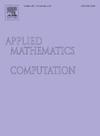混合攻击下复值延迟记忆神经网络均方指数同步的切换事件触发控制
IF 3.4
2区 数学
Q1 MATHEMATICS, APPLIED
引用次数: 0
摘要
研究了复值延迟记忆神经网络在复值混合攻击下的均方指数同步(MSES)问题。考虑cvdmnn的右侧不连续,基于Filippov微分包含理论对系统进行了分析,并采用区间矩阵法处理记忆连接权,从而构造了便于分析的误差系统。为了充分利用有限的通信资源,引入了一种复值交换事件触发机制。此外,为了减轻复杂值混合攻击的影响,包括复杂值重放攻击和欺骗攻击,遵循伯努利分布,设计了一个安全控制器,可以同时抵消误差系统中残余项的干扰。在此基础上,构造了分段Lyapunov泛函,利用Lyapunov稳定性理论和不等式技术,得到了在复值混合攻击下实现MSES的充分条件。基于导出的同步准则,提出了确定系统最大允许重放率和欺骗攻击率的算法。最后,通过数值算例验证了所提方案的有效性和优越性。本文章由计算机程序翻译,如有差异,请以英文原文为准。
Switching event-triggered control for mean-square exponential synchronization of complex-valued delayed memristive neural networks under hybrid attacks
This paper investigates the mean-square exponential synchronization (MSES) of complex-valued delayed memristive neural networks (CVDMNNs) under complex-valued hybrid attacks. Considering the discontinuous right-hand sides of CVDMNNs, the systems are analyzed based on Filippov differential inclusion theory, and the interval matrix method is used to handle the memristive connection weights, thereby constructing error systems that are amenable to analysis. To utilize limited communication resources, a complex-valued switching event-triggered mechanism is introduced. Furthermore, to mitigate the effects of complex-valued hybrid attacks, consisting of complex-valued replay attacks and deception attacks following the Bernoulli distribution, a secure controller is designed that can simultaneously counteract the interference caused by residual terms in the error systems. On this basis, a piecewise Lyapunov functional is constructed, and the sufficient condition for achieving MSES under complex-valued hybrid attacks is derived using Lyapunov stability theory and inequality techniques. Based on the derived synchronization criterion, algorithms are proposed to determine the maximum allowable replay and deception attack rates of the system. Finally, a numerical example is provided to validate the effectiveness and superiority of the proposed scheme.
求助全文
通过发布文献求助,成功后即可免费获取论文全文。
去求助
来源期刊
CiteScore
7.90
自引率
10.00%
发文量
755
审稿时长
36 days
期刊介绍:
Applied Mathematics and Computation addresses work at the interface between applied mathematics, numerical computation, and applications of systems – oriented ideas to the physical, biological, social, and behavioral sciences, and emphasizes papers of a computational nature focusing on new algorithms, their analysis and numerical results.
In addition to presenting research papers, Applied Mathematics and Computation publishes review articles and single–topics issues.

 求助内容:
求助内容: 应助结果提醒方式:
应助结果提醒方式:


